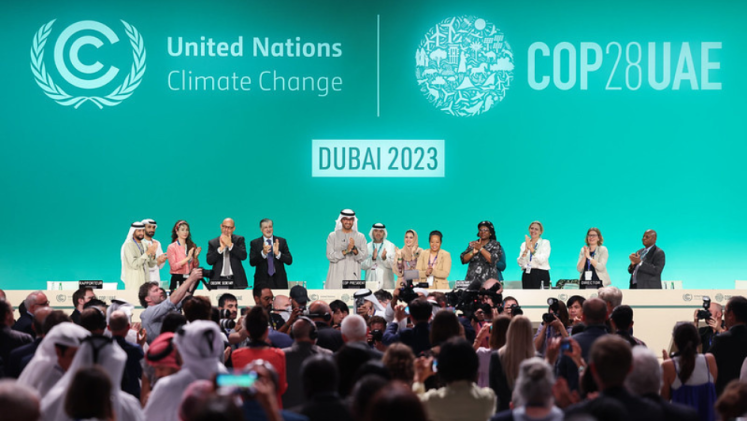COP28, the largest UN Climate Conference to date, is came to an end with a historic agreement. During the two-week negotiations in Dubai, UNU-EHS experts participated in discussions and provided input and submissions. Our experts unpacked the most important parts of the COP28 outcomes here:
Global Stocktake – Science drives policy and signals end of fossil fuel era
COP28 has successfully concluded the Global Stocktake, a collective assessment of progress towards the Paris Agreement goals. This critical step serves as a guide, informing countries' climate policies scheduled for revision and update by 2025. The message from this stocktake is clear: global efforts in emission reduction and climate adaptation fall short. Its outcome, named the “UAE Consensus”, was born from intense dialogues between countries and sets new benchmarks for international climate policy. For the first time, it connects emission reduction targets to specific goals for renewable energy (tripling capacity until 2030) and energy efficiency (doubling energy efficiency – the harder call of the two). Crucially, it signals the transition away from fossil fuels. COP28 reaffirms the commitment to phase out coal power generation and the eradication of pervasive fossil fuel subsidies.
Loss and Damage Fund –Response to escalating climate impacts
On the first day of COP28, a significant milestone was reached with the decision to establish the Loss and Damage Fund and funding arrangement. The Fund aims to assist vulnerable developing countries in responding to the adverse effects of climate change in cases that emerge quickly or unexpectedly as well as in those that emerge gradually over time.
Pledges, including a contribution from the host country UAE, exceeded 600 million USD. While the decision is a landmark, several follow-up decision points were still left open and are to be decided by a new board, such as when the new board will be operational, who will be in it, as well as how the World Bank will manage specific details as the hosting organization for the fund.
In a separate decision, the Santiago Network was confirmed to be hosted by a consortium integrated by United Nations Office for Project Services (UNOPS) and the UN Office for Disaster Risk Reduction (UNDRR). The Network is foreseen to play a crucial role in building the capacities of countries, aiming to support them in accessing the newly created Fund.
Global Goal on Adaptation – Crafting resilient futures
The COP28 session saw the concrete establishment of the Global Goal on Adaptation (GGA), a significant development following its conception in the Paris Agreement in 2015. Unlike global mitigation goals, the GGA focuses on enhancing adaptive capacity and reducing vulnerability. COP28 delivered a framework that articulates specific targets and aspirations for global adaptation action. The GGA, awaited with anticipation, now provides a new screenplay for adaptation action. The next steps are clear: countries must advance implementation at both national and local levels while ensuring that these ambitious indicators capture the complexity of our dynamic and interconnected world. To this end a 2-year work programme was launched that will develop a set of relevant indicators.
Just Transitions – Enabling climate action
COP28 transforms the vision of a just transition into tangible reality, aligning with the UAE Consensus and the social landscape essential for transformation. The detailed Work Programme on Just Transition Pathways signifies progress, emphasizing organization, inclusivity and multilevel engagement that includes cities and communities. Meaningful dialogues at the local level and the explicit reference to resilience underscore a commitment to a comprehensive and sustainable just transition. Likewise, the COP28 outcome also promotes the concept of Adaptive Social Protection, with several mentions throughout the decisions.
Road ahead: Tackling the ambition and implementation gap
The UAE Consensus is a diplomatic success that shows commitment and multilateralism. In times of diverse crises, polarization and conflict, it shows that UN processes can deliver agreements. The climate crisis can only be overcome by cooperation at all levels and scales. However, even the boldest decision holds no value if it does not result in tangible emission reductions (to align with a 1.5° C warming scenario, global emissions will have to nearly half until 2030) and increased resilience of frontline communities. Climate finance is a key enabler for climate action. Strikes to reform the international finance architecture to foster investments and resources in vulnerable countries is one key milestone for 2024. The next COP29 in Baku, Azerbaijan, will have to set a new climate finance goal in line with the investment needs for a climate transition that includes setting new responsibilities for (newly) industrialized countries. Most importantly, countries will have to revise their next generation of climate plans and policies, both in terms of ambition and implementation. The UAE Consensus can act as a guiding star for countries to fully embrace more sustainable and inclusive futures that include renewable energy and effective adaptation actions.



